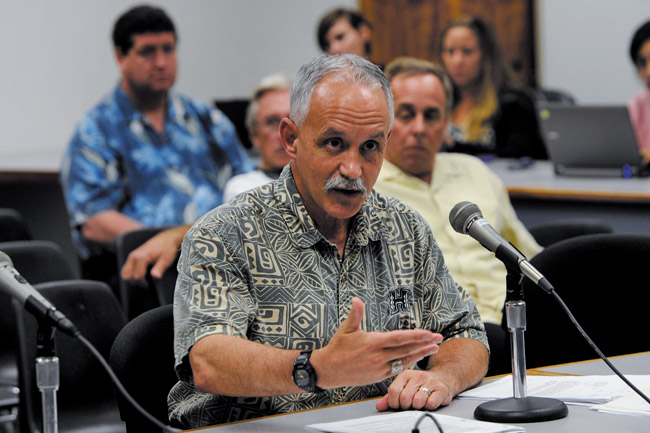A For Apple In Debt Payoff Approach
A month ago University of Hawaii chancellor Tom Apple announced he would ask the Board of Regents to forgive the athletic depart-ment’s $13 million debt as part of a plan to fix the department’s financial woes.
Last week he delivered on that promise and presented the board with a plan to write off what was essentially accounting debt, and to supply the department with extra operating funds by cutting scholarship costs and paying for some staff positions. The board unanimously endorsed the plan that will save the athletic department an estimated $1.6 million in tuition and $1.2 million in salaries and benefits.
It was, much like the customers who enter Gold and Silver Pawn, the best deal anyone involved could have hoped for. Without a sudden and sustained influx of cash, the money owed would never have been repaid.
“We don’t have the revenue streams,” says athletic director Ben Jay directly. “If we were in control of the revenue coming from the stadium, that would help, parking – all this would help, and could we use the surpluses we have here to pay down the debt? Yeah, we could, but it would be years.”
Rather than continue hope for financial rescue, Apple correctly decided to count the debt as a loss and move on. The actual time frame for the removal of the $13 million liability is yet to be determined, as the funds to do so will be spread over a number of years, using investment profits from other campus accounts.
“There were many who said just write it off and take the hit once, but I’d rather make sure we use the right kind of funds,” says Apple. “I feel really pretty good about using interest income to pay this off because that way it is clear there is no academic money and no student money being used.”
Apple says the university has about $160 million in various accounts that are invested and generate interest. Using these, he says, he can draw down the debt without tapping into academic and tuition funding.
Of course, what constitutes tuition funding can be a matter of semantics. This was expressed by University of Hawaii Professional Assembly board president
David Duffy, who told the Star-Advertiser last week that reducing tuition rates for out-of-state student-athletes would increase the burden on other students.
Apple’s plan is to allow a certain number of athletes to qualify under a “gifted student” program that would extend residency tuition rates to incoming students who show exceptional ability in either athletics, academics or the arts. The university currently offers similar tuition breaks to military members and their dependents, Native Hawaiians not living in Hawaii, and residents of certain Pacific island nations.
The university also takes part in the Western Undergraduate Exchange, which allows undergraduate students to attend an outof-state university without paying full nonresident rates. The number and type of eligible students will be determined by a to-be-convened panel of faculty, counselors and administrators.
Duffy’s point is easy to understand. The university’s primary focus must be on education and research, and the success of the athletic program has no impact on the school’s ability to do both jobs. UH isn’t Alabama. Students don’t enroll at UH to be part of an athletic-based community, but rather because they live in the state or are attracted by the academic reputation of certain departments. This fact doesn’t, however, make Apple’s decision incorrect.
Whether you accept the premise that athletics is an integral part of the university doesn’t matter. UH has little choice but to raise its financial commitment or cut support all together.
“What you are really asking is, ‘Do we want athletics?’ says Apple. “Because we know what it costs and that somebody has to pay for it, and I’d rather we use these sources. It is true that these sources could be used for other things, but that’s really saying we don’t ever want to cover the costs of athletics, which means we don’t want to do athletics. I think the entire community wants us to have a strong athletics program. As soon as we make that decision, then we all have to realize we have to invest in it, and I think this is the best way to do it.”
He’s right.
The status quo only will continue the department’s slide back into insolvency, which would create an even bigger deficit down the road. The current budget of about $34 million will need an additional $2 million per year just to tread water, and that is not likely to come from ticket sales alone. smurray@midweek.com Twitter @SteveMurray84






